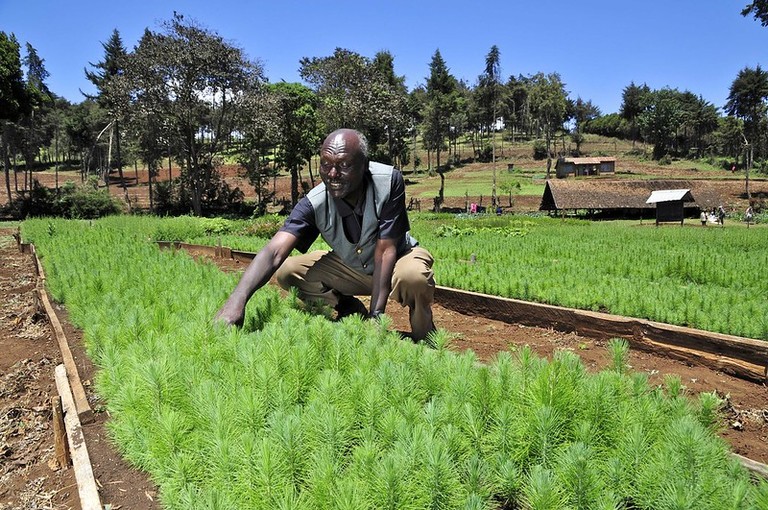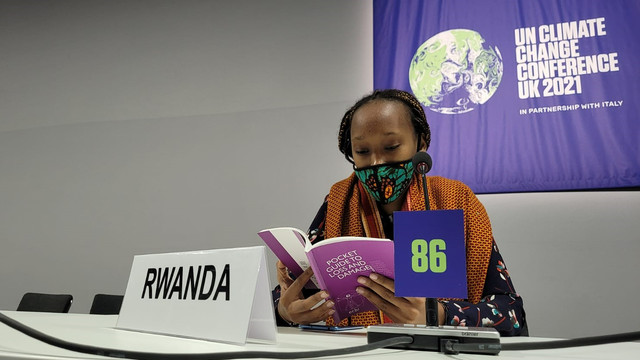Significant new support for locally led adaptation principles
Danida, Sida, USAID and the Dutch Ministry of Foreign Affairs are the latest donor agencies to endorse eight principles for locally led adaptation, developed to help ensure that local communities are empowered to lead sustainable and effective adaptation to climate change at the local level.

Farmer in Mount Kenya region in Kenya (Photo: 2010CIAT/NeilPalmer via Flickr, CC BY-SA 2.0)
Endorsement from the Ministry of Foreign Affairs of Denmark (Danida), Swedish International Development Cooperation Agency (Sida), US Agency for International Development (USAID) and Dutch Ministry of Foreign Affairs for the principles for locally led adaption was announced today at an event held in the Resilience Hub at COP26.
The four international development agencies join over 70 governments, leading global institutions and local and international NGOs in endorsing the principles and are advocating their endorsement by others. This includes accredited entities to the major climate funds – Fundecooperación from Costa Rica and Fundación Avina from Latin America – who play a crucial role in directing climate finance to the local level.
IIED welcomes this significant new donor backing, which comes on the climate summit’s Adaptation and Resilience Day. Our webpage on the principles for locally led adaptation lists all eight principles and the existing endorsers.
Real support for a crucial local role
Today’s endorsements see the four international donors join a growing number of organisations representing some of the excluded local people that the principles for locally led adaptation intend to support.
At COP26, Green Africa Youth Organisation (GAYO), Youth Climate Lab, Centro para la Autonomía y Desarollo de los Pueblos Indígenas (CADPI) and Wangki Tangni from Nicaragua joined other organisations representing excluded people including Slum Dwellers International (SDI) and Tebtebba (the Indigenous Peoples’ International Centre for Policy Research and Education).
Their ask to the international community is clear: the principles must not just be on paper. When organisations or institutions move to endorse, they are encouraged to outline what they intend to do differently or good practices that will be strengthened to better support or enable locally led adaptation action.
Growing financial pledges still lag behind local needs
To date, over US$600 million has been pledged for locally led adaptation through Kenya’s Financing Locally-Led Climate Action (FLLoCA) programme with the World Bank, the LDC Initiative for Effective Adaptation and Resilience (LIFE-AR), ADB Community Resilience Partnership Programme (CRPP), and the COP26 Presidency’s Task Force on Access to Climate Finance (PDF). This includes US$232.6 million to the Adaptation Fund – which has endorsed the principles.
Despite these growing pledges, the gap remains large and funds earmarked for locally led adaptation must be accountable so that they do indeed reach and are controlled by local actors. There have been calls for $1 billion annually for ‘direct access' finance that reaches the local level.
IIED and partners will continue to call on the global community of practice on adaptation to help move programmes, funding and practices towards adaptation that is increasingly owned by local stakeholders.
Eight principles for a 10-year journey
The locally led adaptation principles were developed by a partnership of peers – championed by commissioners of the Global Commission on Adaptation – to highlight what needs to happen to shift power into the hands of local stakeholders and what ‘business-unusual’ could look like.
The growing community of practice includes IIED, the World Resources Institute, International Centre for Climate Change and Development (ICCCAD), SDI, BRAC International, the Huairou Commission and more than 70 other organisations ranging from donors, funders, delivery partners, Southern governments, social movements and NGOs.
Published by IIED in January 2021, the principles herald the start of a 10-year learning journey to promote locally led adaptation for all those who endorse them. The journey includes two upcoming events that will be used to grow a community of practice around locally led adaptation action:
- This year’s Development & Climate Days, co-hosted by IIED in Glasgow and online tomorrow and the next day (9-10 November 2021)
- The second Gobeshona Global Conference on Locally Led Adaptation, to be hosted by ICCCAD and the University of Bangladesh in January 2022.




